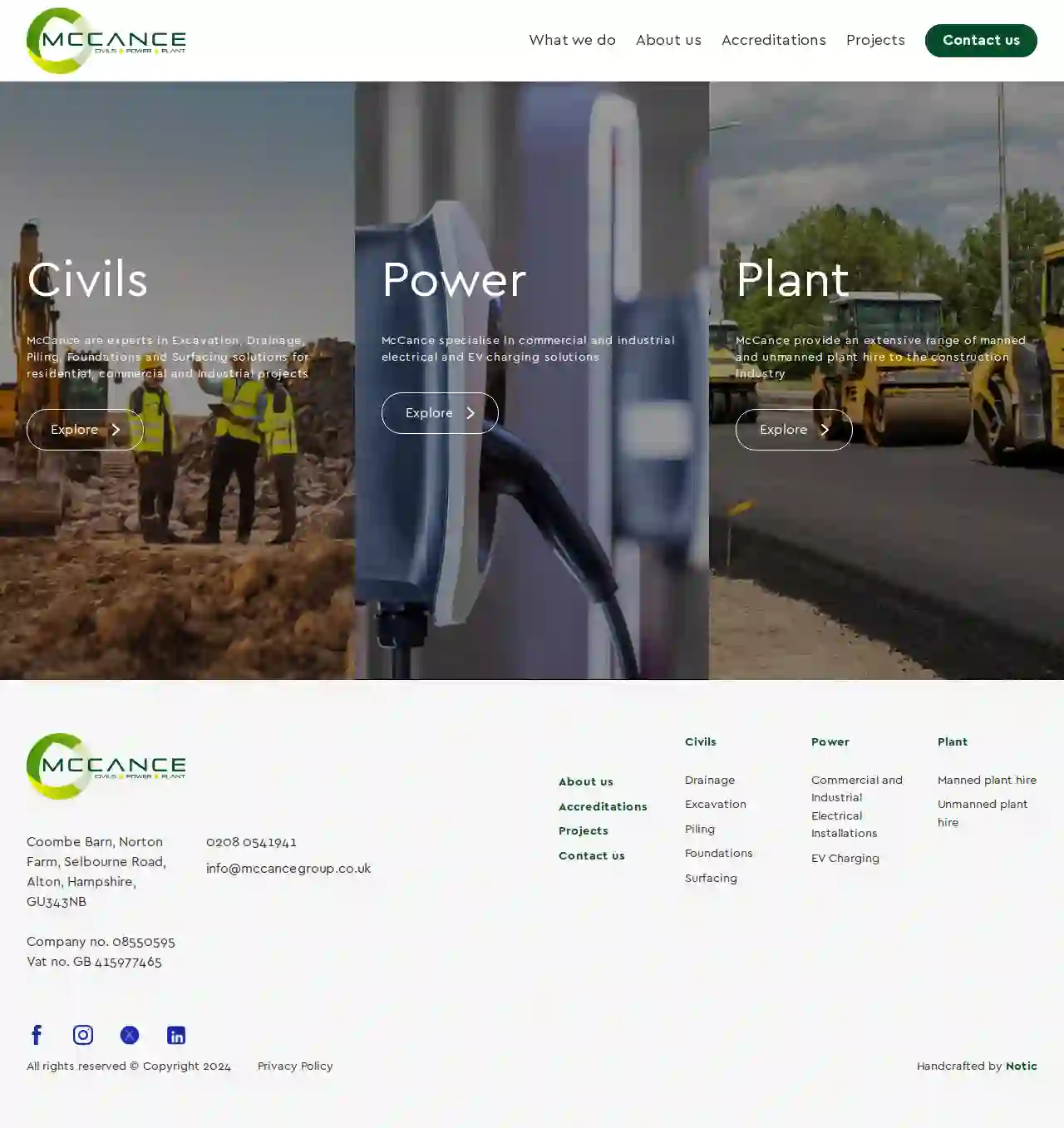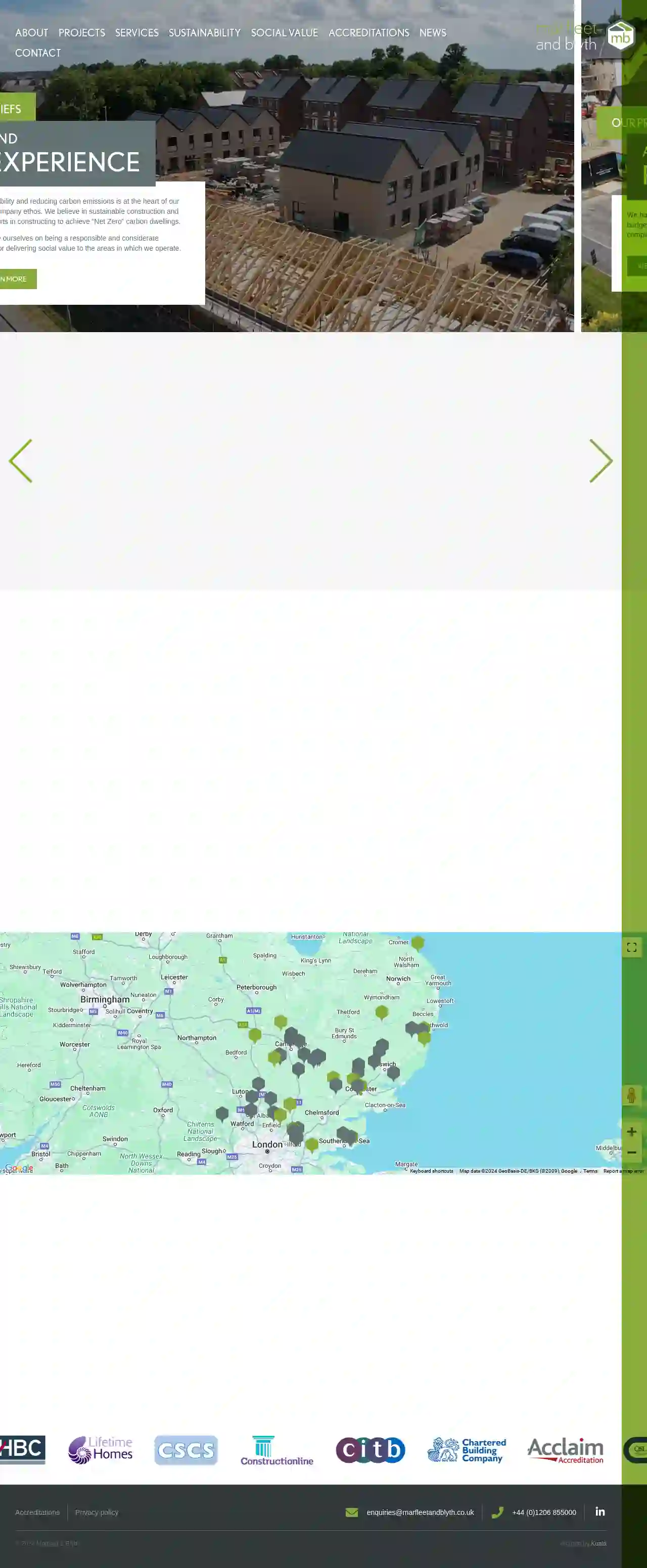Excavation Contractors Fleet
Find top Excavation Company Near Me in Fleet
Receive multiple Land Excavation quotes for your project today! Compare profiles, reviews, accreditations, portfolio, etc... and choose the best deal.
- Wo
Woodhams Group
4.49 reviewsFleet, GB- Services
- Why Us?
Get Quote - MS
MSY Grab Hire
52 reviewsFleet, GB- Services
- Why Us?
Get Quote - B
B & T Plant Hire
4.520 reviewsFleet, GB- Services
- Why Us?
Get Quote 
DA Johnstone Plant Hire LTD Plant Office
1Johnstone House, Longhirst, Morpeth, United Kingdom, NE61 3HZ, GBWelcome to D A Johnstone Plant Hire DA Johnstone Plant Hire Ltd are a family-owned excavator hire company that has been in business for over 27 years. We have a wide range of excavators available for hire, from 1 tonne to 50 tonnes, and we’re proud to be one of the most reputable plant and machinery hire companies in the country. Whether you’re looking to road construction or landscaping, we have the right excavator for your project. And because we’re a family business, you can be sure that you’ll receive the personalised service that you deserve. Contact us today to find out more about our Nationwide plant and machinery hire services. 27 YEARS IN THE BUSINESS DA Johnstone Plant Hire Ltd are a family-owned excavator hire company that has been in business for over 27 years. We have a wide range of excavators available for hire, from 1 tonne to 50 tonnes, and we’re proud to be one of the most reputable plant and machinery hire companies in the country. Whether you’re looking to road construction or landscaping, we have the right excavator for your project. And because we’re a family business, you can be sure that you’ll receive the personalised service that you deserve. Contact us today to find out more about our Nationwide plant and machinery hire services.
- Services
- Why Us?
- Testimonials
- Gallery
Get Quote
McCance Group
1Coombe Barn, Norton Farm, Selbourne Road, Alton, Hampshire, GU343NB, GBMcCance Group: Your Trusted Partner for Construction and Infrastructure Solutions McCance Group is a leading provider of construction and infrastructure solutions, specializing in a wide range of services including civils, drainage, excavation, piling, foundations, surfacing, power, and plant hire. We are committed to delivering high-quality, reliable, and cost-effective solutions to meet the needs of our clients. Our team of experienced professionals is dedicated to providing exceptional service and exceeding client expectations. We are committed to safety, quality, and environmental responsibility in all our operations. Whether you are a residential, commercial, or industrial client, McCance Group has the expertise and resources to handle your project from start to finish. We are proud to have a strong track record of successful projects, and we are committed to building long-term relationships with our clients. Contact us today to discuss your project needs and learn how McCance Group can help you achieve your goals.
- Services
- Why Us?
- Gallery
Get Quote
Marfleet and Blyth - Chartered Building Contractor, Essex
52 reviewsFleet, GBMarfleet and Blyth Marfleet and Blyth are a Chartered Building Contractor, with a focus on providing the highest levels of professional service delivered through sustainable construction, customer care and continuous improvement. Our Beliefs and Experience Sustainability and reducing carbon emissions is at the heart of our group company ethos. We believe in sustainable construction and are experts in constructing to achieve “Net Zero” carbon dwellings. We pride ourselves on being a responsible and considerate contractor delivering social value to the areas in which we operate. Our Projects and Portfolio We have an excellent track record of delivering on-time and within-budget, with many schemes handed-over ahead of contract completion.
- Services
- Why Us?
- Accreditations
- Our Team
- Gallery
Get Quote- Wr
Wroxton Ltd
11 reviewsFleet, GB- Services
- Why Us?
Get Quote 
M&M Demolition (London, Kent & Essex)
13 reviewsEnterprise House, Ocean Way, Enterprise HouseOcean Way, Southampton, SO14 3XB, GBLondon, Kent & Essex Demolition and Enabling Works Services From our Dartford base we cover the whole of London, Kent, Essex and surrounding areas also in Southern Counties & Northern Counties Professional We carry out commercial demolition & deconstruction projects for private and public sector backed by a £10m public liability & employers insurances. Sustainable With industry and political focus is on reducing waste to landfill, we have simplified the segregation process to produce waste as much as possible. Specialist Our environmental services team works along with our demolition specialist to survey, report, plan, and remove hazardous materials like asbestos. Partner We work in partnership with clients to advise, enable, and implement. Consult one of our experienced experts and find out how we can help you. Minimising impact to the neighbouring community & surrounding environment
- Services
- Why Us?
- Accreditations
- Gallery
Get Quote
Onsite Building Control
56 reviewsSentinel House, Ancells Business Park, Sentinel House Ancells Business Park Harvest Crescent Fleet, Fleet, GU512UZ, GBOnSite Building Control OnSite Building Control is a limited company approved as a Building Control Body by the Government’s Department for Communities and Local Government (DCLG) via their Designated Body, the Construction Industry Council and listed on the official approved inspector register. Why Choose OnSite? OnSite Building Control offers a professional, efficient, and cost-effective Building Control Service with many benefits over the service traditionally provided by the Local Authority. We are able to integrate into the design and building team to assist clients in achieving their project time scales and commercial goals. Our Team Our surveyors are highly dedicated, professionally qualified individuals who take pride in their work. They have considerable experience in all types of building work and understand the issues and financial pressures on all clients, particularly those operating in the commercial sector. Our Services We provide a quality, independent, cost-effective Building Control Service for all building projects, including new speculative housing. This means that OnSite can accept applications, check and certify building work, be it domestic or commercial work, an extension to your house, or a multi-million pound shopping centre.
- Services
- Why Us?
- Our Team
- Gallery
Get Quote- Fo
Force One Groundworks
1Fleet, GB- Services
- Why Us?
Get Quote
Over 11,537+ Excavation Pros in our network
Our excavation experts operate in Fleet & beyond!
ExcavationHQ has curated and vetted the Best Excavation Businesses in Fleet. Find the most reliable business today.
Frequently Asked Questions About Excavation Contractors
- Project Size and Scope: Larger, more complex excavations naturally take longer.
- Soil Conditions: Rocky or challenging soil types can slow down progress.
- Site Accessibility: Limited access might require more time for maneuvering equipment and hauling materials.
- Weather: Inclement weather can cause delays.
- Permitting and Inspections: Waiting for permits or inspections can extend the timeline.
- Clearly Define the Scope: Outline the project's goals, including the excavation area, depth, grade, and intended use.
- Obtain Necessary Permits: Research and acquire any required permits from your local authorities.
- Mark Utility Lines: Contact your utility companies to locate and mark underground utilities to prevent damage.
- Communicate with Neighbors: Inform your neighbors about the project's timeline and potential noise or disruptions.
- Prepare the Site: Clear any obstacles, such as vegetation, furniture, or structures, from the excavation area.
- Discuss Safety Protocols: Review safety procedures with the contractor to ensure a safe work environment.
How long does an excavation project take?
What is the difference between cut and fill excavation?
Cut: Involves excavating soil from an area where the existing grade is higher than the desired grade.
Fill: Refers to using the excavated soil ('cut' material) to raise the grade in an area where the existing grade is lower than desired.
This method minimizes the need to import or export soil, reducing costs and environmental impact. It's commonly used for site preparation, road construction, and landscaping.
What should I do before excavation starts?
What is the difference between topsoil and subsoil?
Topsoil: The uppermost layer, typically rich in organic matter, nutrients, and microorganisms. It's essential for plant growth and is often darker in color.
Subsoil: The layer beneath the topsoil, containing less organic matter and generally denser. It provides support for roots but is less fertile than topsoil.
During excavation, topsoil is often removed and preserved separately for later use in landscaping, while subsoil is typically used for backfilling or other less demanding applications.
How long does an excavation project take?
- Project Size and Scope: Larger, more complex excavations naturally take longer.
- Soil Conditions: Rocky or challenging soil types can slow down progress.
- Site Accessibility: Limited access might require more time for maneuvering equipment and hauling materials.
- Weather: Inclement weather can cause delays.
- Permitting and Inspections: Waiting for permits or inspections can extend the timeline.
What is the difference between cut and fill excavation?
Cut: Involves excavating soil from an area where the existing grade is higher than the desired grade.
Fill: Refers to using the excavated soil ('cut' material) to raise the grade in an area where the existing grade is lower than desired.
This method minimizes the need to import or export soil, reducing costs and environmental impact. It's commonly used for site preparation, road construction, and landscaping.
What should I do before excavation starts?
- Clearly Define the Scope: Outline the project's goals, including the excavation area, depth, grade, and intended use.
- Obtain Necessary Permits: Research and acquire any required permits from your local authorities.
- Mark Utility Lines: Contact your utility companies to locate and mark underground utilities to prevent damage.
- Communicate with Neighbors: Inform your neighbors about the project's timeline and potential noise or disruptions.
- Prepare the Site: Clear any obstacles, such as vegetation, furniture, or structures, from the excavation area.
- Discuss Safety Protocols: Review safety procedures with the contractor to ensure a safe work environment.
What is the difference between topsoil and subsoil?
Topsoil: The uppermost layer, typically rich in organic matter, nutrients, and microorganisms. It's essential for plant growth and is often darker in color.
Subsoil: The layer beneath the topsoil, containing less organic matter and generally denser. It provides support for roots but is less fertile than topsoil.
During excavation, topsoil is often removed and preserved separately for later use in landscaping, while subsoil is typically used for backfilling or other less demanding applications.